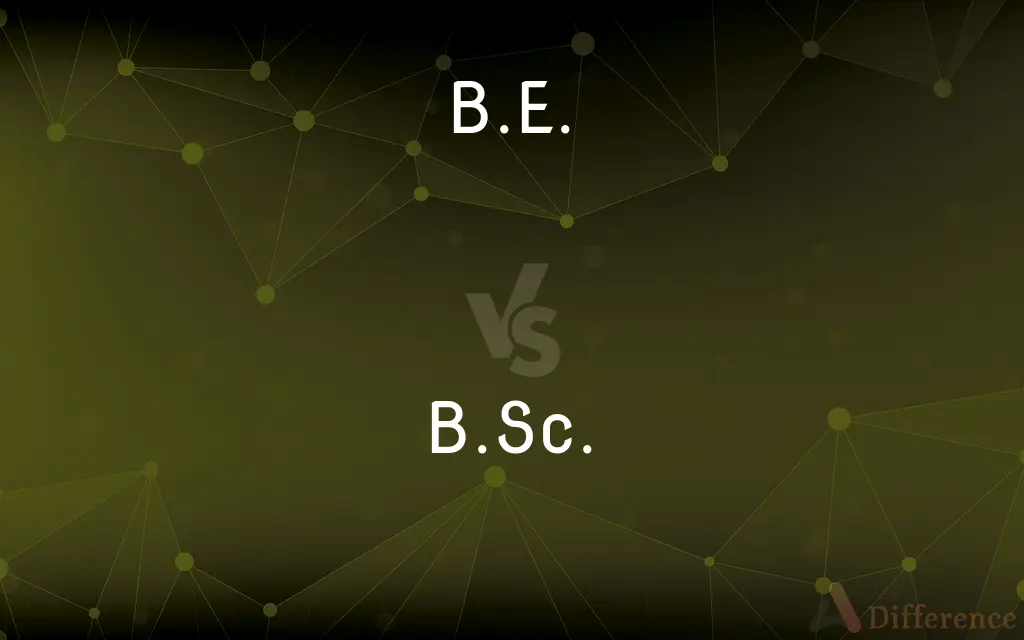B.E. vs. B.Sc. — What's the Difference?
Edited by Tayyaba Rehman — By Fiza Rafique — Published on November 27, 2023
B.E. stands for Bachelor of Engineering, focusing on applied science and technology, while B.Sc. stands for Bachelor of Science, which is a general undergraduate degree in various scientific disciplines.

Difference Between B.E. and B.Sc.
Table of Contents
ADVERTISEMENT
Key Differences
B.E., or Bachelor of Engineering, is a professional undergraduate degree awarded to students who have completed courses in engineering and technology fields. On the contrary, B.Sc., short for Bachelor of Science, is awarded to students who have studied a range of scientific subjects, encompassing physical, life, and computational sciences.
In terms of curriculum, B.E. emphasizes the application of scientific principles to design, analyze, and innovate technology and systems. B.Sc., meanwhile, is more about understanding, exploring, and explaining scientific phenomena and principles.
Duration-wise, both B.E. and B.Sc. courses typically last for a similar duration, usually three to four years, depending on the country and institution. However, the structure of the B.E. program is often more rigid due to its professional nature, whereas B.Sc. might allow more elective choices.
Career paths for B.E. graduates are generally in engineering fields, including mechanical, civil, electrical, and computer engineering, to name a few. B.Sc. graduates, in contrast, have a wide range of career opportunities, from research and development to teaching or further academic pursuits in their respective disciplines.
Institutions offering B.E. courses usually have specialized labs, workshops, and industry partnerships due to the program's applied nature. B.Sc. courses, however, might have more emphasis on theoretical classes, though lab work is still an integral part of many B.Sc. programs, especially in the physical sciences.
ADVERTISEMENT
Comparison Chart
Nature of Degree
Professional undergraduate degree in engineering.
General undergraduate degree in scientific disciplines.
Focus
Application of scientific principles in technology and design.
Understanding and explaining scientific phenomena and principles.
Typical Duration
3-4 years (varies by country and institution).
3-4 years (varies by country and institution).
Career Opportunities
Engineering fields like civil, mechanical, electrical, etc.
Research, development, teaching, or further academic pursuits.
Course Structure
More rigid with specialized labs and industry partnerships.
More flexible with a stronger emphasis on theory, though lab work is common.
Compare with Definitions
B.E.
B.E. is a degree in the field of engineering.
John completed his B.E. in Civil Engineering from a renowned university.
B.Sc.
B.Sc. delves deep into scientific theories and principles.
During his B.Sc., he learned about quantum mechanics and relativity.
B.E.
B.E. graduates can become licensed engineers.
After her B.E., Lisa became a licensed electrical engineer.
B.Sc.
B.Sc. programs often involve research projects.
For her B.Sc. thesis, Sarah researched climate change impacts on marine life.
B.E.
B.E. emphasizes the practical application of science.
After his B.E., he was equipped with the skills to design and construct infrastructure.
B.Sc.
B.Sc. may serve as a foundation for higher studies.
After his B.Sc., Michael plans to pursue a Ph.D.
B.E.
B.E. involves studying specific engineering disciplines.
Samantha is pursuing her B.E. in Computer Engineering.
B.Sc.
B.Sc. is an undergraduate degree in science.
Alex graduated with a B.Sc. in Physics.
B.E.
B.E. programs usually have mandatory internships or projects.
As part of his B.E., Mark worked on a robotics project.
B.Sc.
B.Sc. offers a wide range of specializations.
Rachel is studying for her B.Sc. in Microbiology.
Common Curiosities
How long does it typically take to complete a B.E. degree?
It usually takes 4 years of full-time study to complete a B.E. degree.
What is the primary focus of a B.E. degree?
B.E. primarily focuses on the study, application, and design of engineering and technology.
What's the difference between B.E. and B.Tech?
Both B.E. and B.Tech are undergraduate engineering degrees. The difference is mostly regional or based on the naming convention of the institution. Their curricula can be very similar.
What does B.Sc. stand for?
B.Sc. stands for Bachelor of Science.
In which institutions is B.Sc. typically offered?
B.Sc. is typically offered in colleges and universities that provide undergraduate science programs.
Can B.Sc. be pursued in fields other than pure sciences?
Yes, B.Sc. can also be pursued in applied sciences, computer science, agriculture, nursing, and other specialized areas.
In which institutions is B.E. typically offered?
B.E. is typically offered in technical institutions, engineering colleges, and universities.
Are there integrated courses combining B.E. and B.Sc.?
While B.E. and B.Sc. are distinct, some institutions offer integrated dual-degree programs that might combine aspects of both, like B.Sc. + M.Tech.
What does B.E. stand for?
B.E. stands for Bachelor of Engineering.
Which professions can B.E. and B.Sc. graduates typically enter?
B.E. graduates typically become engineers, researchers, or technical consultants. B.Sc. graduates can become scientists, researchers, educators, analysts, or pursue professions related to their specific field of study.
Can someone pursue a master's after B.E. or B.Sc.?
Yes, after completing B.E., one can pursue M.E. or M.Tech. After B.Sc., one can pursue M.Sc. or other specialized master's programs.
Do both B.E. and B.Sc. require a final year project or thesis?
This varies by institution. Many B.E. programs require a final year engineering project, and some B.Sc. programs might require a thesis or project based on the field of study.
What is the primary focus of a B.Sc. degree?
B.Sc. primarily focuses on the study of natural or applied sciences.
How long does it typically take to complete a B.Sc. degree?
It usually takes 3 to 4 years of full-time study to complete a B.Sc. degree, depending on the country and institution.
Share Your Discovery

Previous Comparison
Christmas vs. New Year
Next Comparison
PNG 24 vs. PNG 8Author Spotlight
Written by
Fiza RafiqueFiza Rafique is a skilled content writer at AskDifference.com, where she meticulously refines and enhances written pieces. Drawing from her vast editorial expertise, Fiza ensures clarity, accuracy, and precision in every article. Passionate about language, she continually seeks to elevate the quality of content for readers worldwide.
Edited by
Tayyaba RehmanTayyaba Rehman is a distinguished writer, currently serving as a primary contributor to askdifference.com. As a researcher in semantics and etymology, Tayyaba's passion for the complexity of languages and their distinctions has found a perfect home on the platform. Tayyaba delves into the intricacies of language, distinguishing between commonly confused words and phrases, thereby providing clarity for readers worldwide.













































